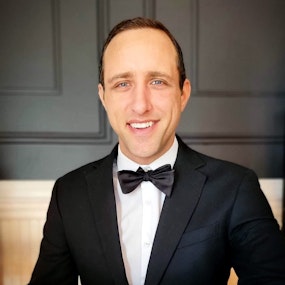

Join us as we learn more about Shannon Imler and his family's path to success as they live by their core values and work with a spirit of inclusion and respect. Shannon says, "What drives me is a deep-rooted passion for bringing joy and cherished moments to others."

The Colors of Sound Podcast
Season 2, Episode 10
Ice Cream Factory: The Shannon Imler Interview
Join us as we learn more about Shannon Imler and his family's path to success as they live by their core values and work with a spirit of inclusion and respect. Shannon says, "What drives me is a deep-rooted passion for bringing joy and cherished moments to others."
The Colors of Sound Podcast. Discover how much we have in common.
#TakeBackMonday, #Purpose, #Service, #Community, #People, #InnerCircle, #QuoteOfTheDay, #community-service, #bronx, #smallbusiness, #newyork, #black, #positivevibes, #learning, #workshop, #intergenerational, #podcasting, #LiveBrave, #intergenerationalprogramming, #technology, #LifeLearner, #ColemanGlobal
--- Send in a voice message: https://podcasters.spotify.com/pod/show/wdon1204/message Support this podcast: https://podcasters.spotify.com/pod/show/wdon1204/support
In a world where so many things are vying for your time, I just wanted to say, Thank You for your attention.
In Unity,
Timothy
Timothy Coleman (00:01.934)
All right, awesome. Welcome, everybody. This is Timothy Stone Dancer Coleman with the colors of sound podcast. Thank you for joining us for another episode. I am so happy to have today's guest with us. You aren't going to believe the fan the phenomenal things that he's been up to, and the amazing way that he's incorporated family and community into his business and everything that he's doing. So would you please give a warm welcome for Mr. Shannon Imler.
from Missouri, Shannon, thank you so much for being here with us, man.
Shannon Imler (00:34.617)
Thank you so much for having me. I really appreciate the opportunity to, you know, talk about our community, family, business, and everything else.
Timothy Coleman (00:44.45)
That's great. That's great. So let's jump right in, man. Where are you from? And, you know, do you still live in that same place? Are you close to that same place? Like, where are you now?
Shannon Imler (00:55.529)
You bet. So I'm from a small town in central Missouri. It's called Eldon and it's just on the north side of Lake of the Ozarks, about 4,500 people. I grew up there on my family's farm and I still live there with my wife and two sons. And so we're really, really thankful to live in a close knit community. And we're actually in the process of moving though. So to Lebanon, Missouri, which is about an hour south for our...
our new ice cream plants. We're kind of in the first big transition as far as relocating them alive.
Timothy Coleman (01:33.486)
Cool, that's really dope, that's really dope. So now as you're growing up in your hometown, like who were some of your inspirations and kind of like what was your view on the world, right? Like I'm from a small town as well. I'm from Lincoln, Nebraska, so hello to the Midwest, right? So, but like what were some of your kind of like when I grow up, I'm gonna be this, you know, as you envision.
the world at large, as you know it, coming from a place that has such a small population.
Shannon Imler (02:05.569)
Sure, absolutely. Whenever I grew up in a small population, I always wanted to dream big. So it started out, most of my childhood, I wanted to play in the NBA. For some reason, I thought that was gonna be my future. Every single day I played basketball. From as soon as I could dribble until I was about 15 years old, I went to summer camps, played basketball. I played basketball all year round. Absolutely.
Timothy Coleman (02:22.606)
Thank you.
Shannon Imler (02:34.681)
loved it. I grew up when I was a child during the Bulls era and so I watched every single game in front of the TV and so my eyes were like glued to that and I was really focused on that. After I got into high school, you know, like I realized, hey, maybe I'm not as good as I think I am and so through all those years, you know, I played basketball all the time but what I really did a lot more than that
Timothy Coleman (02:40.626)
Yeah, yeah.
Timothy Coleman (02:52.942)
Yeah.
Shannon Imler (03:02.665)
was I worked on our family farm. I would wake up every morning, I would feed hogs, I would feed the cattle, we would combine soybeans, corn. Basically, whatever it took, I was there. I was working with my brother, my dad and my grandpa, and night and day, summers in the hay field. And so, you know, if basketball didn't work out, my dream of basketball, that's kind of like my plan to fall back on is farming. And so...
It's just kind of interesting, you know, things didn't happen exactly like I thought they might, but that was, that was my childhood.
Timothy Coleman (03:38.925)
Right. That's really, really cool. I mean, you know, in everything that you're saying, I hear a lot of character building. You know, I hear a lot of perseverance, you know, there's so much that I think comes from being from a smaller place. I've been living in the Bronx, New York for 23 years. But you know, coming from a smaller place.
I the values that you wind up with I think carry through and shine through in everything that you do And so I think that's really cool now, but I'm curious like what was you know coming from that kind of a background Where you're very hands-on and it's farming and it's you know real labor-intensive What was your first like company that you started was it connected to that at all or were you involved in that same? Type of area or did you immediately just take the lessons that you learned as a kid?
Shannon Imler (04:18.123)
Mm.
Timothy Coleman (04:29.587)
and apply them in a different area.
Shannon Imler (04:32.817)
You know, I took the lessons as a kid that I learned, you know, the values of hard work, persistence is key. So it didn't matter what we were doing on the farm, like something broke, an animal got out, you name it, something went wrong, and you can't just throw in the towel and give up. That was never an option. And so that was one of the main key values that I still, you know, care with me today is just persistence.
and it's translated over into my business life now. It translated into the time when I didn't get accepted to college. And so that's pretty key. And I never really had a transition into farming or agriculture after I graduated from high school. I realized that
Timothy Coleman (05:10.239)
Mm-hmm.
Shannon Imler (05:29.021)
hey, like it's extremely hard to make a living at this. I looked at my parents and my grandparents that were just barely scraping by. Some years made no money, lose money. Every once in a while they might make a profit on something. And I seen the difficulties and knew that I had to do something a little bit different. But I did take everything I learned about hard work, persistence, family. And you know,
Timothy Coleman (05:37.932)
Right, right.
Shannon Imler (05:58.929)
I used that in the construction field as soon as I graduated. And it proved to be invaluable to me. And it really, really helped me do much better than I ever would have done if I wouldn't have grown up on a farm. I'm confident of that.
Timothy Coleman (06:01.141)
Mm-hmm.
Timothy Coleman (06:17.754)
That's powerful. That's really, really powerful. So talk to me a little bit. You mentioned your family. Talk to me a little bit about your family and how involved are they in the work on a day-to-day basis and how, you know, are they your springboard? How engaged are they in everything that's happening? I'm certain they're supportive, but how engaged are they?
Shannon Imler (06:19.425)
Thanks.
Shannon Imler (06:40.145)
Yeah, you bet. So my immediate family now was my wife, Katie, my two sons, Vincent and Harrison. Harrison's four years old, and Vincent just turned two months old. So they are they're fully ingrained every single day and every single thing that I do now. My father, my siblings, they're not they're still on the exact same farm.
they are still, they still have cattle, they still have hogs, they do row crops. And that key word kind of goes back to that. They're still persistent. Whether it's making money or not, they're not giving up. That's what they were born to do. And those are the gifts that they were given. And they just keep on keeping on. And so there's a lot of respect I have for them. And that's really impactful. Now, don't get me wrong.
Timothy Coleman (07:10.307)
Nice. That's right.
Shannon Imler (07:38.993)
Each one of them are at any events that I have for our ice cream business. They're there, they're supportive, they're always there. But just kind of stuck on a different path of life. But my two sons and my wife Katie, they're just really my rock and I can lean on them for anything I need in this business any day.
Timothy Coleman (07:44.203)
Oh, yeah.
Timothy Coleman (08:03.318)
That's powerful, man. Thank you. Yeah. You know, listen, I mean, my father used to say, you know, hard work, perseverance, and integrity are all day choices. And so I love what you're saying in that, you know, the family is still doing what's in their blood to do, right?
anything wrong with that? Like I go back to something you said a moment ago, I was not the sports person. Like if entertainment didn't exist, I'm not too sure like where I'd be flipping fries right now. But like, you know, that was kind of like my the thing that saved me, you know, like being able to be involved in entertainment and that kind of thing. And meanwhile, the rest of my family are all like educators and military folks. And so I'm like the odd guy out. So I totally understand, you know, what you're saying in terms of like,
Shannon Imler (08:36.639)
Yeah.
Timothy Coleman (08:53.322)
walking your path. And that's definitely something that in my work in the community, especially like in the Bronx, in the South Bronx, and I mean, this is kind of a global thing for youth in general, is that you always have to encourage young people to find their path and walk their path, even if it's not the same thing that other folks in the family or folks that you know are doing. So I think it's really powerful.
Shannon Imler (09:10.593)
Mm-hmm.
Shannon Imler (09:17.244)
Absolutely. I couldn't agree more. Totally on board with what you're saying there. Absolutely.
Timothy Coleman (09:23.938)
So now let's get to the heart of the matter, right? Now, I think when anybody hears the title ice cream, it immediately brings a smile to the face. And so, you know, a funny quick little story is that, you know, I had taken this closet in the Bronx and turned it into my little studio long before COVID and before it became like the sheik thing during COVID when you just needed space away from everybody else.
And one of the big reasons was because where I live is like highly populated. And so the ice cream truck is, you know, like the minute the sun parts, the clouds, like you can hear that guy, you know, he's coming from a distance and like, you, you know, you just feel the energy of it. And it reminds me of my youth and all that sort of stuff. So I built a space where that wouldn't be so prevalent all the time in my ears. However, when I hear homemade ice cream, I absolutely still smile about it. So talk to me about.
Shannon Imler (09:52.481)
I'm sorry.
Timothy Coleman (10:21.026)
How did the idea come up for Ice Cream Factory and how did you go from vision to actual the first day of operation? Like how did you operationalize the vision of what you're doing right now?
Shannon Imler (10:36.817)
Well, after I graduated high school and entered the construction field, I knew deep down that I was made to be an entrepreneur. I felt it. I started my own business. I learned so many different things through failure in the general contracting industry and it really, really taught me so much.
And so that was really kind of a foundation, you know, for Ice Cream Factory. I learned, you know, how to interact with people. I learned how to, you know, fix problems. I learned, you know, all the rules and everything like that. And, you know, throughout the years, I was very fortunate and I was very blessed to be able to do great work for great people. But one of our biggest and most rewarding projects that we were fortunate enough to be a part of,
It was a Kraft Cheese Factory in our hometown of Elton, Missouri. And so we were, we've always been passionate about our hometown, about our community, and always, you know, volunteer and do whatever we can to make the community a better place. And we had picked up some older buildings, and there was a, when I say Kraft Cheese Factory, it's a 1931.
Timothy Coleman (12:01.786)
Wow.
Shannon Imler (12:02.121)
old, old factory that was in the middle of our downtown. It just right in the heart. And it was the biggest eyesore you can imagine. The roof had blown off. The roof had collapsed in places and we just felt a calling to get involved. And also the price on it, it was for sample two years. And we knew when we could fix it. I had extensive history and construction.
But you know what? So we took a chance. We took a chance. It was, I would say around five years ago now. And we just felt a calling to do it for our community. We didn't know exactly what we would do with the building. We just considered it maybe a commercial investment whenever we purchased it. And so that was okay with us. We're okay with a commercial investment at the time. But as we neared completion of this old factory,
We kind of put some pieces together and inside of it, there were drains in the floors. There were areas where they smoked cheese, different bays. And we heard from locals just kept pouring in to the community and they said, hey, you know what, I used to work here and this is where we made the cheese, this is where we brought the milk in, this is how this basically, this dairy manufacturing business worked. And...
Timothy Coleman (13:20.112)
Oh wow. Yeah.
Shannon Imler (13:28.529)
And so we kind of became inspired by that and we knew the facility was just meant to be a dairy facility. And what better way to kind of honor that and bring the community together and do something special by not only restoring this 1931 old dump back to its former glory, but by making an ice cream shop for the community, they could filter through it.
Timothy Coleman (13:51.842)
I'm going to go ahead and turn it off.
Shannon Imler (13:57.501)
Our very first time we opened, we did a golden ticket thing, just like on the Willy Wonka movie. And we just had, yeah, we had the best time. I think every single person in our small town, they were so ecstatic. They all came. It was such a huge opening. And right after we opened, it's like, you know what? This is it. We're making a difference. We're doing something special for our community.
Timothy Coleman (13:58.31)
That's right.
Timothy Coleman (14:04.73)
Oh, like Willy Wonka.
Timothy Coleman (14:24.398)
That's right.
Shannon Imler (14:26.549)
for the people, they're happy. You know, our mission and our company is spreading happiness to the world through high quality ice cream. And that moment after we opened and I've seen the impact that we made, it's like, man, that's it. That's my calling in life. And that's how we can make a difference. Not only in my small local community here in rural Missouri, but farther out. And so that's kind of that.
Timothy Coleman (14:27.21)
Yes.
Timothy Coleman (14:36.832)
Mmm.
Shannon Imler (14:52.989)
kind of the spark just right after you open it kind of kind of lit a fire in me. So.
Timothy Coleman (14:58.534)
I love it. Oh my God, I love it. I love that story. So how did you come up with the name Ice Cream Factory? Like I love what you're saying, that you honored the building by keeping it kind of in the same genre, right? And that you're...
Shannon Imler (15:07.797)
Yeah.
Timothy Coleman (15:14.45)
uh, you were able to bring your construction skills into it to create a space that the community could feel comfortable and welcomed inside of. But how, you know, a name is everything, right? Ice cream factory. When I was reading your bio, I honestly was like, Oh my, Oh my God. Like it felt like it existed for like 20, 30, 40 years. The name is so perfect.
Shannon Imler (15:24.127)
Yeah.
Yeah.
Shannon Imler (15:34.301)
Yes. And so that's a great question. And that's was one of our major like hang ups. Like we knew that we wanted to make an ice cream shop. We knew it. And my wife, Katie and I, we just kind of, we made a list and we narrowed them down. And, you know, we went back and forth, you know, this one's good, this one's bad. And we were trying to get super creative. And everybody in our town called it the cheese factory. So it'd been the cheese factory.
for like, you know, close to 90 years. And everyone was like, oh, you know, Shannon and Katie are fixing up the cheese factory. And so I'm like, Katie, let's just keep it simple. Let's, you know, keep the factory. Everybody knows it as a factory, but it's not cheese. We're not making cheese here. Let's just put ice cream in that place. And we just kind of thought about it and that was it. And we just, it was simple, but it defined, you know, it defined what we were doing. You know, we were making ice cream.
Timothy Coleman (16:05.875)
Right, right, right.
Shannon Imler (16:32.273)
So that's kind of how it came about.
Timothy Coleman (16:37.118)
But it's so brilliant. I mean, I can't, I wish I were closer. I'll look on the app and I mean the website and figure out if you've got something over here on the East Coast. But I mean, it is such a perfect, perfect name because what it gives me when I ice cream factory like it gives me exactly the image of when I went to your website. Okay, so everybody who is listening to this, you know, you really have to make it over.
to icecreamfactoryco.com, so you can see this for yourself. But for everyone who is watching, here's a little video of Ice Cream Factory of how to navigate their website, something very cool and quick, because the amount of flavors, this is what was killing me. I sat on my couch before this interview reading all these flavors and daydreaming of how yummy they taste. So how...
How is the ice cream made? I see that you say you have, you're sourcing local ingredients and that sort of thing. So I don't wanna get into the proprietary stuff, but how are you bringing it together?
Shannon Imler (17:40.672)
Yeah.
Sure, yeah, and that's a question that a lot of times I just kind of laugh at because I think back to like day one, like what I was doing, and then I think about today and the changes in our processes. They've been so significant. Day one, we started out with what was declared as a boat anchor. And so when I say a boat anchor, there was like a used kitchen equipment place.
Timothy Coleman (18:02.743)
Mm-hmm.
Shannon Imler (18:10.953)
And they were keeping this machine for parts in case somebody's like old junker broke down. And they're like, you don't need to use it to make ice cream. It's really a boat anchor, but it does work and you can try it. And it's $2,000. And I said, well, I can afford it. I'm going to try it. Let's make it work. And so literally from day one, we took that $2,000 machine stuck in her back room and a little closet, and we went to the grocery store across the street.
Timothy Coleman (18:11.976)
Uh-huh.
Timothy Coleman (18:17.594)
Yeah
Timothy Coleman (18:30.09)
Yeah.
Shannon Imler (18:38.721)
and just bought what we needed to make ice cream. And I think back now, you know, a lot of our staff are still with us from day one. And we talk about it like, what were we thinking? We thought that ice cream was amazing. And it was, it was good, but nowhere near as good as what we're doing now. So it wasn't like, like on day one, we had everything that we needed. It's taken years and it's taken, you know, learning. And most importantly, all the failures and all the mistakes get to where we are now. Fast forward to today.
Timothy Coleman (18:46.818)
That's great.
Shannon Imler (19:09.277)
You know, we make our ice cream on a manufacturing line. There is a very large machine called a continuous freezer, which just pumps out a stream of ice cream all day long, super, super fast. And we feed cookies, we feed caramels, and it forces its way into the ice cream stream. And then we have filling equipment. So some people might've just seen like factors of filling equipment. We have a filler.
that fills pints, you know, super duper fast. And we just have a team that boxes everything up and puts it in a freezer. So it's just a totally different, from 2019 to when we're talking right now, we are like full blown ice cream factory, like manufacturing style production line to where, you know, we also make our own dates, goods and inclusions that go in the ice cream.
Timothy Coleman (19:37.641)
Yeah.
Shannon Imler (20:04.645)
but that's more automated and our consistency today and our quality with our clean label product that we switched to and the baked goods, it's so much better than almost anything you buy in the store. So we're really proud of it. We're really proud of our processes. There are a few proprietary things.
Timothy Coleman (20:16.801)
Nice.
Shannon Imler (20:30.897)
Certain way we bake things, certain way we feed our inclusions into it that allow us to have like, you know, two or three chunks of brownies or cake pieces in every bite as to where like, you know, the bigger guys. But we're not afraid to take outside the box and modify equipment to where it packs a lot more cookies and stuff in our ice cream. And so that's what makes it special. That's what we're proud of. Yeah.
Timothy Coleman (20:47.351)
That's right.
Timothy Coleman (20:54.962)
And we love you for that. We love you for that.
Shannon Imler (20:59.021)
And that's what I tell our team. Like, I promise you guys, we're never going to get a complaint for too many cake pieces or cookies. Like nobody's, they're going to be thrilled. Um, but we're, we're going to get a complaint for not enough. So let's pack the peanut butter in there, pack the cookies in there. Um, let's make it work. We want good stuff. So, but yeah, that's day one to right now, you know, just, uh, and throughout the years, uh, man, it's just, uh, just gotten a little better every time we.
Timothy Coleman (21:14.462)
Right. That's right, that's right.
Shannon Imler (21:28.848)
It's a little bit better, a little bit easier on my stuff.
Timothy Coleman (21:33.234)
Man, listen, black walnut, blackberry cobbler, brownie blast, I am a sucker for butter pecan, cake batter, which looks like the smoothest thing I've ever seen. Like I don't even see, like that looks so delicious and crazy. Chocolate chip cookie dough, like I mean, oh, and look as you go down the page, cobalt cookie, coconut almond paradise. So where do these flavors come from? Like are you just sitting in the kitchen like, hey honey, try this. Like how are you coming up with the different flavors?
Shannon Imler (21:35.585)
Mm-hmm.
Shannon Imler (21:40.756)
Yeah.
Shannon Imler (22:03.261)
Well, that, yeah, that started back in 2019. And so that's one of the best parts is like, we have like some, we had some major flops. Like we threw out some weird stuff at first. And like I said, we were just buying stuff and putting it in ice cream and we didn't know any different. So once again, the good stuff came from our failures. You know, we had dill pickle ice cream one time.
Timothy Coleman (22:24.929)
Right.
Timothy Coleman (22:29.302)
Mm-hmm.
Shannon Imler (22:31.209)
It was, we call them factory flops is what we label them as. And that didn't work. We tried bacon maple ice cream. That didn't work. We tried potato chip. It didn't work. And so we learned the hard way, you know? That's the way that really sticks with people is learning the hard way. And so some of them did work though, you know, like our blackberry cobbler, our gooey butter cake. And we had so many flavors at first.
and we just sorted them out, you know? And we would give ice cream to people and just tell them to give us feedback. And we would get honest feedback. We would get people to say, hey, nobody's gonna eat this. So just trash that idea. Trash, don't do that anymore. And then we would get some, you know, we'd get some thumbs up too. And we had people come in our kitchen while we were making it. And you know, help us create stuff too. And so that was the cool part about the early days.
is we really figured out, like, we didn't have, you know, like a highly paid advisor that was in the ice cream business from somewhere else, like, came in and gave us a book of secrets. We didn't have that. We just had, you know, our life experiences and we had, you know, mistakes. And we just took that and we turned them into what works. And so that's kind of how we got to those flavor lists you're reading off.
Timothy Coleman (23:48.908)
Mm-hmm. Yeah.
Timothy Coleman (23:58.146)
That's really amazing. I mean, you know, again, I want to point out for folks that you are you have developed a really great way of changing the perception of the word failure. You have brought it out in such a positive light. Right. You said first that failure as a lesson. And so in my mind, I'm thinking, wow, failure is a lesson and not a rebuke. Like what if that could be the mantra that our young people catch on to?
that failure is not, it's almost not even that word anymore. It's like you're changing the definition of it.
Shannon Imler (24:33.693)
Yeah, absolutely. It's just the way you learn and how you retain things. You're gonna learn a whole lot faster whenever you fail. And somebody else telling you what not to do, what to do, when to do it, that doesn't stick with you quite the same as just complete failure. So it's really, really powerful and it's powerful for us.
Timothy Coleman (24:54.822)
A hundred percent.
Shannon Imler (24:59.445)
So, no, it's all right. It's been powerful for us. And I get asked all the time, like, well, how'd you do it? Or how'd you know to do this? And I'm like, I did not, I screwed up. Here's all my list of mistakes. And that's why we don't do it that way. And we do it a different way. And there's something to be said about that. And I think maybe other people or entrepreneurs or people in life or...
Timothy Coleman (25:00.014)
I'm sorry, go ahead. Yeah, I'm sorry to interrupt. Yeah, yeah, yeah. That's super powerful.
Timothy Coleman (25:14.254)
Hehehehehehehehehehehehehehehehehehehehehehehehehehehehehehehehehehehehehehehehehehehehehehehehehehehehehehehehehehehehehehehehehehehehehehehehehehehehehehehehehehehehehehehehehehehehehehehehehehehehehehehehehehehehehehehehehehehehehehehehehehehehehehehehehehehehehehehehehehehehehehehehehehehehehehehehehehehehehehehehehehehehehehehehehehehehehehehehehehehehehehehehehehehehehehehehehehehehehehehehehehehehehehehehehehehehehehehehehehehehehehehehehehehehehehehehehehehehehehehehehehehehehehehehehehehehehehehehehehehehehehehehehehehehehehehehehehehehehehehehehehehehehehehehehehehehehehehehehehehehehehehehehehehehehehehehehehehehehehehehehehehehehehehehehehehehehehehehehehehehehehehehehehehehehehehehehehehehehehehehehehehehehehehehehehehehehehehehehehehehehehehehehehehehehehehehehehehehehehehehehehehehehehehehehehehehehehehehehehehehehehehehehehehehehehehehehehehehehehehehehehehehehe
Shannon Imler (25:28.105)
maybe sometimes too afraid to make a mistake or to fail or, you know, they think, what if, and, um, you know, and I'm glad that we never did, you know, in my life and in our business, um, it's, it's helped us succeed, you know, in our business and helped us not to have any regrets really. So that's, that's super, super powerful for us.
Timothy Coleman (25:32.438)
Yeah.
Timothy Coleman (25:51.696)
Absolutely, absolutely. I mean, you know, when you talk about resilience, when you talk about faith, when you end believing in yourself, when you talk about perseverance, you know, I think these are core values. And so I'm certain that that's, you know, going to be
Shannon Imler (25:56.513)
Mm-hmm. Yeah.
Timothy Coleman (26:08.958)
what's in the taste of the product. You know what I'm saying? Like when people have this much love and are this close to the actual product, you absolutely can taste the difference of that. And so for that, I'm jealous of everybody in your town. You know, I want to say real quick, you know, I saw this article online, and it's the top five reasons to why Ice Cream Factory is so amazing.
And so I don't know if you've seen this, but the first one is Ice Cream Factory is local. It's family run and founded. You have locally sourced ingredients. It's always fresh. You don't have to worry about tons of preservatives. See, that's the other thing, like the after effects of some of the products that are on the market right now is really eating people alive and you're popping all these pills. Number four, you give back to the community. So I wanna chat about that and then...
premium 14% butterfat is in the ice cream? Dude, like, you could just taste it in the air. Like, right? So before we get to the butterfat, like talk to me about what does Ice Cream Factory do as well as you and the family? Like, what do you do to give back to the community aside from the amazing thing of, you know, taking this old 1930s building and bringing it back to life as a part of everybody's
Shannon Imler (27:10.undefined)
Hahaha.
Shannon Imler (27:13.567)
Yeah.
Timothy Coleman (27:33.795)
you know, childhood memory, love and conversation, what are some of the other things that you guys are doing?
Shannon Imler (27:40.789)
So the first thing that's heavy on my heart that I think about all the time, and it's from my upbringing, or like the dairy farmers and the agriculture community. And so anytime that we see a need in ag community, dairy farmers, they really are the backbone of my business. And they are the ones that make this possible. And like I said earlier,
Sometimes it's for a profit, sometimes it's for a loss, but they persevere, they keep on doing it. And anytime that we can sponsor, a dairy farmers kids team, sports team, or if we can go to a dairy conference and support them in some way, or if there's an FFA, Future Farmers of America event, and we can be the ice cream sponsor, or like a Brown Swiss Cow Association, like we will always, we will always,
Timothy Coleman (28:14.897)
Yeah. Mm. Yeah.
Shannon Imler (28:37.705)
We'll bring the ice cream, we'll put the smiles on their faces. And if there's a sponsorship opportunity, we'll do that too. We'll contribute. You know, that's, that's the most important thing to me, or those, those hard working men, women, and children. Because when you're on the farm, it takes everybody pitching in, you know, that make our industry possible. I mean, just plain and simple. That's, that's the lifeline of our business. And we really, really value them, you know, really a lot. So.
Timothy Coleman (28:55.871)
Yeah.
Shannon Imler (29:07.405)
That's super important. And you know, another thing too, we always, a certain percentage of our proceeds from our certain flavors within our community here, we give that back to schools. So we donate 10% of the schools so that helps fund education for the youth here. So that's really important to us. And you know, and the other way, like, you know, we create,
create jobs, we fixed up some old buildings, and that's great, but just pouring back and investing in those people that took a chance on Ice Cream Factory, and Shannon and Katie's crazy idea, over four years ago, just as we grow as a company, it's really special for us to be able to invest back into them in different ways. And it doesn't always have to be money. It's about...
Timothy Coleman (29:46.319)
Yeah
Shannon Imler (30:06.409)
So I'm caring about them as a person and letting them know that, yeah. Yeah, and like I said.
Timothy Coleman (30:08.682)
Yes, yes, listen, that's an amazing thing right there.
That's amazing because a lot of people are like, oh, I don't have anything I can't give back. I can't give anything but your time, your love, your service. Those are all important and valuable things.
Shannon Imler (30:22.109)
Yes. Yeah.
And that's exactly right. Just showing up if their kids have something going on. We're telling them good job on Friday at the end of the day. We're noticing something specific and saying, hey, you really knocked that out of the park. That means more than a raise, a bonus, a benefit, a whatever, of course we do that, but the impactful things that we can do for our people that have really came together as an organization.
Timothy Coleman (30:47.65)
care.
Shannon Imler (30:55.113)
That's where it's at. That's another important piece where we can give back to those that, and they really deserve it. So they really do.
Timothy Coleman (31:05.242)
That's really powerful, man. Thank you for that. I can only imagine, you know, seeing Ice Cream Factory, you know, like walking in and seeing one wall that has, what did you call them? Flavor flops, right? Like the never to be forgotten.
Shannon Imler (31:21.76)
Yeah.
Timothy Coleman (31:23.126)
like beginning phases of things that didn't work out against the wall, you know, where everything is going really well and has progressed and like you're not only feeding, you know, someone's stomach or someone's craving or whatever, you're also in the business of kind of feeding hearts and minds. I think, you know, donating into education, donating into the community, sending so much love back to people, that's what affects like people's mental health. That's the type of thing that affects
Shannon Imler (31:34.335)
Mm-hmm.
Timothy Coleman (31:52.978)
a community's mental health. When you have multiple people that are proud of where they come from, proud of the values that they grew up with, and are able to then translate that into a business and still be that same person for other people, I think that's really dope. I think that's really, really dope. So it comes along the line of my next question about legacy. Where do you feel like you are?
Shannon Imler (32:17.747)
Mm.
Timothy Coleman (32:20.322)
in your legacy, do you even think about it that way? And what do you hope 20, 30 years from now, as your kids are out of college and kind of sourcing the world, what kind of legacy are you seeking to leave for them?
Shannon Imler (32:39.51)
So I'm really inspired by the story of Milton Hershey and how Milton Hershey created Hershey Pennsylvania. And, you know, my mind, you know, I try to wrap my mind around, you know, what he did. He created, you know, not only one of the leading chocolate companies in the world that still exists today, but he took care of his people better than anyone else.
anybody else in the industry around, you know, the turn of the century, around 1900, he was doing incredible things in Hershey, Pennsylvania. It's still there today. The staff are still they're treated incredibly. But that's really, you know, something that inspires me and that, you know, the story, the person, you know, no matter what, during the Great Depression, he made sure
Timothy Coleman (33:28.655)
Mm-hmm.
Shannon Imler (33:32.757)
that everybody had a job and not just a part-time job, a full-time job to where they could provide for the family. And the thing that he did later on in life is he gave away the ownership to the Milton Hershey school for boys and so he never had any children. And it wasn't about money for him, it was about doing a good thing for people that could really benefit from it.
And so as I go through life and I evaluate my legacy, I really see myself pursuing something similar because I am so moved by what he was able to do. And it's not, I don't do it for the glory of myself, but I think there's a greater good. Our company can do something really special for some really great people. And...
And you know, it may not be my family for generations and that doesn't even matter. That's not what we're here for. We're here to do good things for people who work here, the people in our community, the people of the world. You know, my legacy wants to be spreading happiness to the world through our ice cream. And I think that could, there's so many different ways and the opportunities are endless. And that's really, you know, my legacy. That's where I wanna kind of leave at.
Timothy Coleman (34:43.263)
That's right. I love it. All right. So now.
Shannon Imler (34:58.625)
Yeah, spread the word.
Timothy Coleman (35:05.522)
We talked about a lot of things, right? We talked about failure as a lesson. We talked about perseverance. We talk about faith and believing in yourself. Hometown family values, I think is like one of the major takeaways from this. And, and the ability to create something that will live beyond you, um, no matter the outcome, and, and I think that's super powerful and I want to give honor to the moment and ask you, you know, I know every now and again, we get, um,
Shannon Imler (35:07.378)
Yeah, yeah.
Timothy Coleman (35:34.714)
into conversations and we leave conversations or interviews or just people that we meet on the street and we're like, oh, you know what, I should have said XYZ. So I want to give you an opportunity. Is there something that maybe I didn't even ask about, but that it's really important that you want to make sure that people know or feel or remember about?
Shannon Imler (35:42.569)
Mm-hmm.
Timothy Coleman (35:57.851)
about Ice Cream Factory, about some of the things that you've shared along the way. I think you've done a great job already, but there might be something I don't know about. So what's something else that you might want to share?
Shannon Imler (36:08.957)
Yeah, you know, I've done my absolute best to plug in everything I possibly could, you know, throughout this throughout this. That's really impactful. But, you know, like the one thing that, you know, that I want to kind of kind of plug into like right now, we're in 18 states, about 3000 stores, our ice creams available online. You can order it throughout the continental 48 states at our website.
Timothy Coleman (36:15.042)
Ha ha ha.
Timothy Coleman (36:38.523)
Nice. Yeah. Mm-hmm.
Shannon Imler (36:38.605)
And that does so much good, and we're so fortunate to be in this position. But our company and what we stand for, we're gonna do great things up by the United States. We're looking at other countries to do business with. We're looking at how we can make, we're into the phase of growth to where resource.
certain things from different countries for our ice cream because we have to and making sure that it's, it's ethically sourced. And so that's a big thing for us. We have opportunities to buy packaging in certain places that we don't feel comfortable buying packaging in. And so as we grow and as our company develops, one of the most important things in my mind right now is doing business the right way, spreading happiness.
Timothy Coleman (37:33.838)
Hmm, yes. Yeah. Right.
Shannon Imler (37:36.453)
Not just in that scoop of ice cream and eating it and smiling, but there's so many things and so many ways that you can spread happiness. And we want to make sure that we're thinking about every single thing as a company. Where that plastic lid came from, what ingredients came in that shipping container that went into our blackberry cobbler ice cream and where did they get that very flavor? These are things that we're looking into on a daily basis
Timothy Coleman (38:05.304)
that.
Shannon Imler (38:05.313)
And they make an impact. And they make an impact on happiness in so many different ways. And you could have somebody from a country that's incredibly sad or unhappy providing certain ingredients for this ice cream. And so we don't want that. And so that's something that's so important to us. And that's something that we are fortunate enough now to where we are, we can think about that. And we can make decisions on that.
Timothy Coleman (38:10.455)
That's right.
Timothy Coleman (38:20.502)
That's right.
Shannon Imler (38:33.917)
whether to get things from certain places. And that really, really fully encompasses our mission. And so that's something that we're proud of, that we wanna add and make listeners aware of, that we're conscious of that. And the other companies or manufacturers that aren't, they should be, and it's important. So that's my last little bit there that I think would be important to any listeners that are listening.
Timothy Coleman (38:45.657)
Yeah.
Timothy Coleman (38:56.195)
That's great.
Timothy Coleman (39:03.098)
I think that's powerful. It's like that's my story and I'm sticking to it. That's right. That's right. So folks, please, please head over to the website. I want to give it to you one more time. Icecreamfactoryco.com. As you heard, it's available in all continental 48 states. You know, it's in, it's a, I mean, for mail, right? And then it's available to actually go and get in another 13.
Shannon Imler (39:07.512)
That's right.
Timothy Coleman (39:32.358)
So check out the website, find out more about Shannon Emler and his family and his legacy that they are building there in Missouri. And please, Shannon, you know, at any point in time, if you want to come back and give us an update as you add more things or expand locations, you have an open door to come back. I appreciate, you know, your passion and I appreciate like what you're doing. I don't have to know you personally in order to be proud of you. And I'm really proud of what you represent.
and what your family represents to the community.
Shannon Imler (40:06.264)
Well, that's super meaningful. I really appreciate the opportunity to talk to your listeners and viewers. You're right. I am passionate about it. This is what I'm going to do for the rest of my life. This is my mission.
Just being blessed to be on here today is incredible.
Timothy Coleman (40:26.518)
Beautiful. Well, thank you so much. Have a beautiful day and we will definitely touch base soon.
Shannon Imler (40:32.585)
Thank you.
Timothy Coleman (40:34.272)
All right, bye bye.

Shannon Imler
CEO
My name is Shannon Imler, born in the rural town of Eldon, Missouri, was destined for a life imbued with the values of hard work, dedication, and a deep appreciation for family. My early years were spent on the family's cattle and hog farm, where the ethos of hard work was ingrained in my character from a very young age. Being the oldest of four siblings, I was often tasked with responsibilities that honed my work ethic and taught me invaluable life skills.
Growing up in a small town, I developed a love for sports and community engagement. I was heavily involved in the Future Farmers of America (FFA), a platform that allowed me to cultivate a passion for agriculture and community service. Through FFA, I learned the importance of giving back and fostering a sense of camaraderie within my community.
Upon graduating from high school, I transitioned into the construction industry, where my knack for hard work and meticulous attention to detail flourished. I specialized in building and remodeling Waffle House restaurants, gaining expertise in construction and project management. This path eventually led me to an exciting opportunity—a chance to transform an abandoned former Kraft cheese factory in my hometown.
In a bold move, I seized this chance and spearheaded the renovation project that would breathe life into the forsaken factory. The transformation was nothing short of remarkable, resulting in the birth of "Ice Cream Factory". Ice Cream Factory quickly gained traction as a popular local establishment, capturing the hearts of the co… Read More
Featured Episodes
Check out the latest podcast episodes from our channel.





















